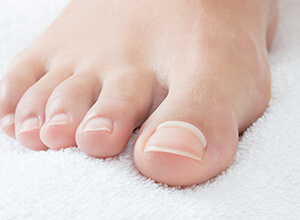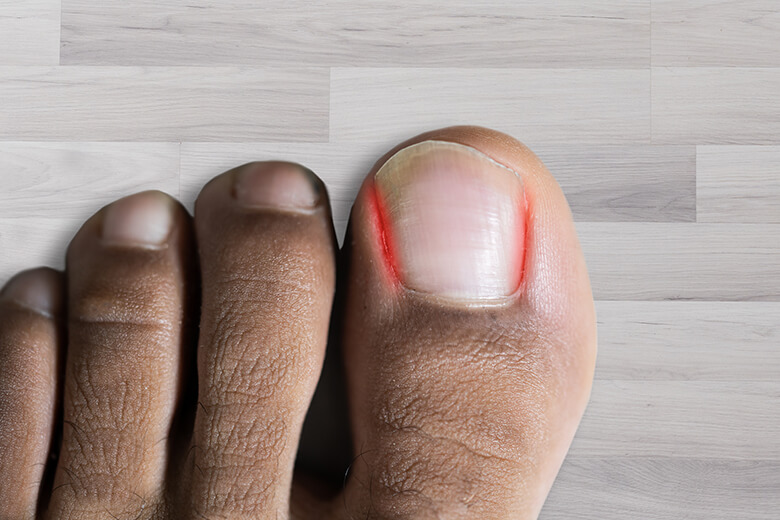Ingrown toenails are a common and often painful condition that can affect anyone, but they are particularly prevalent among adults. Understanding the causes, symptoms, and treatment options for ingrown toenails can help you manage and prevent this uncomfortable condition. In this blog post, we will explore what ingrown toenails are, what causes them, how to recognize their symptoms, and the various treatment options available.
Causes of Ingrown Toenails
Ingrown toenails occur when the edge or corner of a toenail grows into the surrounding skin instead of straight out. Several factors can contribute to the development of ingrown toenails:
Improper Nail Trimming
Cutting your toenails too short or rounding the edges instead of cutting them straight across can encourage ingrowth.
Ill-Fitting Shoes
Wearing shoes that are too tight or narrow can compress the toes, pushing the toenails into the skin. If this is happening, it’s time to replace your shoes.
Injury or Trauma
Stubbing your toe or dropping something heavy on it can cause the nail to grow abnormally.
Genetics
Some people are more genetically predisposed to ingrown toenails.
Infection
Infections near the toenail can lead to swelling and tissue growth, making it more likely for the nail to become ingrown.
Symptoms of Ingrown Toenails
Ingrown toenails can cause a range of symptoms, and their severity may vary depending on the stage of the condition. Common symptoms include:
Pain
Ingrown toenails often cause localized pain and tenderness, especially when pressure is applied.
Redness and Swelling
The affected area may become red, swollen, and warm to the touch.
Infection
If left untreated, ingrown toenails can become infected, leading to pus discharge, increased pain, and a foul odor.
Bleeding
Ingrown toenails may cause bleeding, especially when attempting to trim the nail or when wearing tight shoes.
Difficulty Walking
Severe cases of ingrown toenails can make it difficult to walk comfortably.
Treatment Options for Ingrown Toenails
Treatment for ingrown toenails can vary depending on the severity of the condition. Here are some common approaches:
At-Home Care
In mild cases, you can try soaking your foot in warm, soapy water several times a day, gently lifting the ingrown edge of the nail, and placing a small piece of cotton or dental floss under the nail to encourage it to grow above the skin.
Proper Nail Trimming
Trim your toenails straight across and avoid cutting them too short or rounding the edges.
Footwear
Select shoes that provide enough room for your toes and avoid tight-fitting footwear.
Antibiotics
 If an infection is present, your healthcare provider may prescribe antibiotics.
If an infection is present, your healthcare provider may prescribe antibiotics.
Non-Invasive Treatment
We offer a non-invasive ingrown toenail treatment solution which is painless yet highly effective. Our in-house Professional Foot Care Nurse, Sharon Brophy, is a certified Onyfix® specialist.
Partial Nail Removal
In more severe cases, a chiropodist may need to remove part of the nail or the entire nail to allow the affected area to heal properly.
Surgery
In recurrent or very severe cases, a surgical procedure to remove the ingrown nail and prevent regrowth may be recommended.
Preventing Ingrown Toenails
Prevention is key when it comes to ingrown toenails. Here are some tips to help reduce your risk:
Proper Nail Care
Trim your toenails straight across and avoid cutting them too short.
Footwear
Choose shoes that provide adequate room for your toes and avoid tight-fitting shoes.
Protect Your Feet
If you’re prone to ingrown toenails, consider wearing protective footwear during activities that may put your toes at risk, such as sports.
Maintain Good Foot Hygiene
Keep your feet clean and dry to prevent infection.
Ingrown toenails can be painful and bothersome, but with proper care and attention, they can be managed and prevented. If you suspect you have an ingrown toenail or are experiencing symptoms of infection, it’s essential to seek prompt medical attention to prevent complications. Contact us to schedule an appointment. By following good foot hygiene practices and wearing appropriate footwear, you can reduce your risk of developing ingrown toenails and enjoy healthier, pain-free feet.

